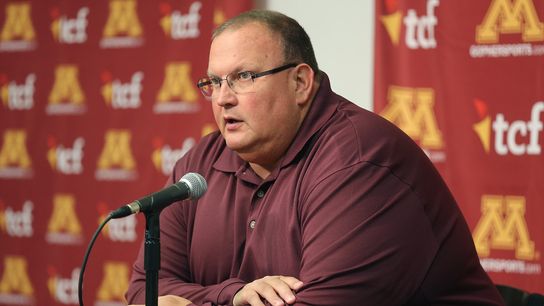Ten players were suspended at Minnesota last season amid sexual assault allegations, a move that two outside attorneys hired by the school's board of regents found to be both lawful and within university policy. The report, released last week, blamed the team-wide protest of those suspensions that threatened the team's participation in the Holiday Bowl on "weak leadership" from the coaching staff.
The Gophers ultimately beat Washington State in that Holiday Bowl, bringing Claeys' record to 11-8 in one-and-a-half seasons as the Gophers head coach. But the school fired him nonetheless, largely related to the handling of said protest. The situation was pretty darn ugly, with former Gophers head coach Jerry Kill saying he'd never step foot on campus again in protest of the firing of his former assistant.
And then the Gophers hired P.J. Fleck and the whole ordeal faded from consciousness. Until last week.
On Wednesday, Claeys penned an essay for the Minneapolis Star-Tribunedefending himself and his handling of the situation last fall. After a Players Tribune-style opening, here's what Claeys had to say for himself:
Last September, I suspended five players for a reported sexual assault. When law enforcement authorities the following month declined to file any charges, the university reinstated those players. At the time, I was congratulated by our athletic director for my handling of this issue and promised that I would remain the head football coach in 2017.
But university officials soon conducted their own inquiry and in December resuspended the five players and suspended five more — again, even though prosecutors had determined there was no basis for formal charges.
Members of our Football Leadership Group and others on the team felt strongly that administration officials had overstepped their authority and that the accused players were treated unfairly and denied protection under due process. To amplify their argument and shine light on what players felt was a flawed and unjust process by the university, the team voted to boycott the Holiday Bowl.
It was a decision that moved us directly into the national spotlight. Unfortunately, some misunderstood or misinterpreted the players’ decision to boycott the Holiday Bowl. They felt that our team and coaches were condoning or downplaying sexual misconduct or assault. Nothing could have been further from the truth.
While it is true that local authorities did not file charges, the university was required by the federal government to conduct a Title IX investigation, which requires meeting a preponderance of evidence, a lower standard than criminal courts.
In light of this new report, are there things I would have done differently? Certainly. First and foremost, I would have remained on campus with my team and coaches rather than attend a Holiday Bowl news conference in San Diego. I’m confident that my presence would have better directed the conversation with our players and that I could have steered them toward something other than a decision to boycott the game.
I also would have refrained from using social media to state my support of the team’s decision. This was too complex and important an issue to address in a 140-character message. It generated more questions than it answered and likely created more problems than it solved.
If that’s proof of “weak leadership” as outlined in the recent Dorsey & Whitney report, then I’m guilty and accept responsibility. If the same goes for refusing to pull the scholarships of those players who voted to boycott the bowl game, as a number of people demanded, then I’m weak there, as well.
I like to think, though, that as a coach I respected my team’s decision, responsibly addressed the situation and quickly defused the boycott. Could it have been handled more smoothly? Maybe. Could it have gone much worse? Without a doubt.
In retrospect, it's clear Claeys was let go because Minnesota wanted to hire Fleck and the breadth and the optics of the protest -- video of players in Minnesota jerseys protesting a sexual assault investigation jumped from the sports page to CNN and beyond -- gave university leadership significant cover to do so.
Claeys has not been picked up by a new staff this off-season, meaning the 2017 campaign will be the first season out of the game in Claeys's adult life. Here's how he closed the essay:
In the months that have passed since the Holiday Bowl and my dismissal as the University of Minnesota football coach, I’ve thought a lot about last season and what might help to move us forward. At the end of the day it is this: Be truthful, hold yourself and others accountable, be mindful of the feelings of others and respect their right to express them.
Sometimes as coaches we learn more from the players than they learn from us. And that’s a pretty good lesson in leadership.
